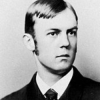Charles Horton Cooley

Charles Horton Cooley
Charles Horton Cooleywas an American sociologist and the son of Thomas M. Cooley. He studied and went on to teach economics and sociology at the University of Michigan, and he was a founding member and the eighth president of the American Sociological Association. He is perhaps best known for his concept of the looking glass self, which is the concept that a person's self grows out of society's interpersonal interactions and the perceptions of others...
NationalityAmerican
ProfessionSociologist
CountryUnited States of America
pain communication loss
One who shows signs of mental aberration is, inevitably, perhaps, but cruelly, shut off from familiar, thoughtless intercourse, partly excommunicated; his isolation is unwittingly proclaimed to him on every countenance by curiosity, indifference, aversion, or pity, and in so far as he is human enough to need free and equal communication and feel the lack of it, he suffers pain and loss of a kind and degree which others can only faintly imagine, and for the most part ignore.
deterioration admiration proof
To cease to admire is a proof of deterioration.
eye men presence-of-mind
We are ashamed to seem evasive in the presence of a straightforward man, cowardly in the presence of a brave one, gross in the eyes of a refined one, and so on. We always imagine, and in imagining share, the judgments of the other mind.
appreciation causes misery
The chief misery of the decline of the faculties, and a main cause of the irritability that often goes with it, is evidently the isolation, the lack of customary appreciation and influence, which only the rarest tact and thoughtfulness on the part of others can alleviate.
moving pride reflection
The thing that moves us to pride or shame is not the mere mechanical reflection of ourselves but the imagined effect of this reflection upon another's mind.
powerful trouble ifs
To persuade is more trouble than to dominate, and the powerful seldom take this trouble if they can avoid it.
men views iron
It is surely a matter of common observation that a man who knows no one thing intimately has no views worth hearing on things in general. The farmer philosophizes in terms of crops, soils, markets, and implements, the mechanic generalizes his experiences of wood and iron, the seaman reaches similar conclusions by his own special road; and if the scholar keeps pace with these it must be by an equally virile productivity.
acting firsts action
We are born to action and whatever is capable of suggesting and guiding action has power over us from the first.
way energy social
The most effective way of utilizing human energy is through an organized rivalry, which by specialization and social control is, at the same time, organized co-operation.
cat cooking care
A cat cares for you only as a source of food, security and a place in the sun.
sports hero past
To have no heroes is to have no aspiration, to live on the momentum of the past, to be thrown back upon routine, sensuality, and the narrow self.
men order grace
A man may lack everything but tact and conviction and still be a forcible speaker; but without these nothing will avail... Fluency, grace, logical order, and the like, are merely the decorative surface of oratory.
pain responsibility relief
When one has come to accept a certain course as duty he has a pleasant sense of relief and of lifted responsibility, even if the course involves pain and renunciation. It is like obedience to some external authority; any clear way, though it lead to death, is mentally preferable to the tangle of uncertainty.
faith-in-god associates
Faith in our associates is part of our faith in God.